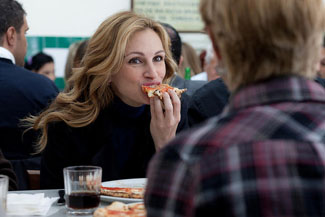|
|
Book vs. Movie: Eat Pray LoveBy Russ BickerstaffAugust 18, 2010
While the relations between the Gilbert character and these three men maintain enough weight to almost kind of feel like a plotline, there isn’t enough substance to them to carry the film. As a result, Eat Pray Love suffers from problems with balance that are similar to those found in the book. Too much time on the romantic end of the Gilbert character draws the film’s center away from the inner journey she’s supposed to have taken. The journey itself seems visually quite interesting, but without enough moments alone between Gilbert and the journey, the bigger aspirations of the script fall considerably shorter than they should. Some of the film’s best moments onscreen are individual moments between an actor and the camera. Roberts has a few really interesting bits of monologue which come across in a much more compelling way than from an author ten years younger than her. Bardem has some characteristically charming moments in the center of the frame. Of particular note is a performance by Richard Jenkins as Richard From Texas - an American Gilbert meets in India. The character never seemed terribly interesting the way Gilbert wrote him - perhaps because her prose style was over-emphasizing how interesting he was. Director Ryan Murphy gives Jenkins enough space to let the character’s charm flow through his section of the narrative somewhat effortlessly. The Verdict Though it is popular at the moment, Gilbert’s Eat Pray Love lacks the kind of insight into journeys of self-discovery that would really make it an enduring classic. The pop biography of a rich woman from a wealthy country visiting places with more history to them gets lost somewhere between a somewhat lifeless, uninspired travelogue and a dispassionate series of journal entries. The film adaptation adds considerable charm to the narrative through focusing on the interpersonal interactions that Gilbert doesn’t seem to pay much attention in the book. Though the film has considerably more charm than the book, it still suffers from a split personality. On one hand, it’s an interpersonal drama and on the other it’s a personal journey. The two never quite coalesce in the movie the way they should. A camera has the benefit of being firmly outside Gilbert’s stiflingly claustrophobic head. Theoretically, that camera could have provided the insight into the journey that Gilbert wasn’t able to. Director Ryan Murphy does a pretty good job of bringing together all the right elements in the right order, but deeper insight is lost to those individual elements. Murphy’s Eat Pray Love is substantially less tedious than the book, but it fails to turn Gilbert’s story into a truly enjoyable film.
[ View other columns by Russ Bickerstaff ]
[ View other Book vs. Movie columns ]
[ Email this column ]
|

|
|
|

|
Friday, May 3, 2024
© 2024 Box Office Prophets, a division of One Of Us, Inc.


